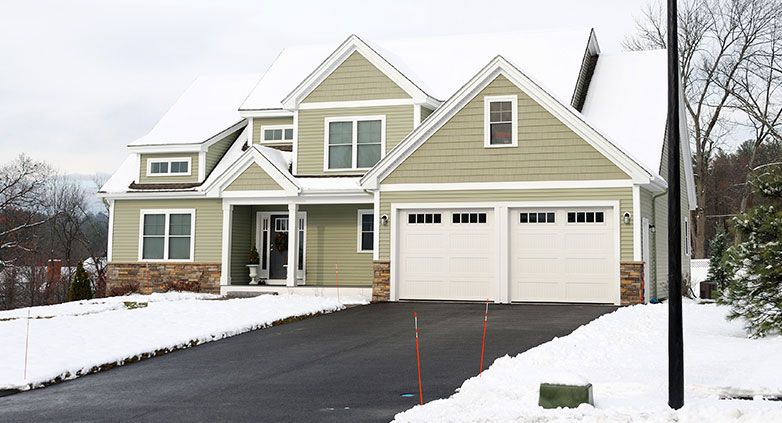Can a Driveway be Paved in Winter? Yes, But…
Curious about “can a driveway be paved in winter?” You’re not alone; many homeowners ponder this during the chilly months.
Yes, paving a driveway in winter is possible, but it requires careful planning and consideration of the weather conditions. The key is to choose the right materials and follow specific cold-weather paving techniques to ensure the pavement sets correctly and lasts. Special cold mix asphalt is often used, which can cure in colder temperatures.
For more insights and tips on winter driveway paving, keep reading. We’ll guide you through everything you need to know to get the job done right.
Asphalt Driveway Paved in Winter
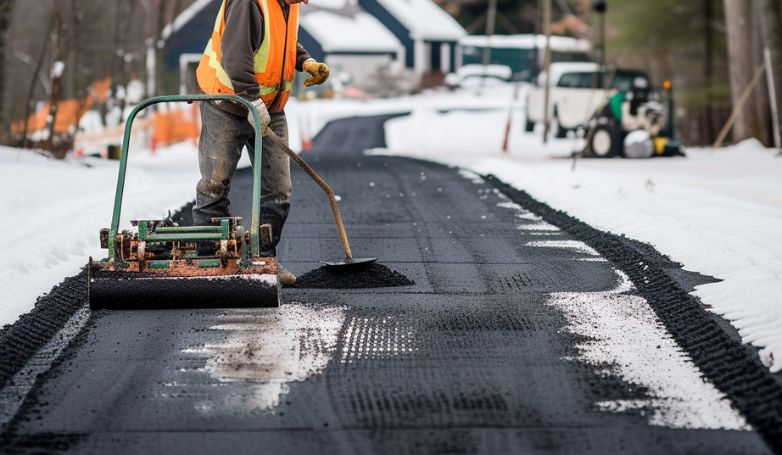
Paving an asphalt driveway in winter comes with its specific considerations. Asphalt needs to be laid at a temperature above 50 degrees Fahrenheit to ensure proper compaction and bonding. Winter paving is feasible on warmer days or in regions with milder winters. The hot mix asphalt used must be kept at a high temperature during transport to prevent premature cooling. Cold weather can shorten the workable time frame for asphalt, necessitating quick and efficient laying and compacting processes.
Best Practices
Pre-plan the project to coincide with warmer winter days, ensure rapid installation to maintain the asphalt’s temperature, and choose an experienced contractor familiar with cold-weather paving challenges.
Threshold for Paving: Below 50°F
Concrete Driveway Paved in Winter
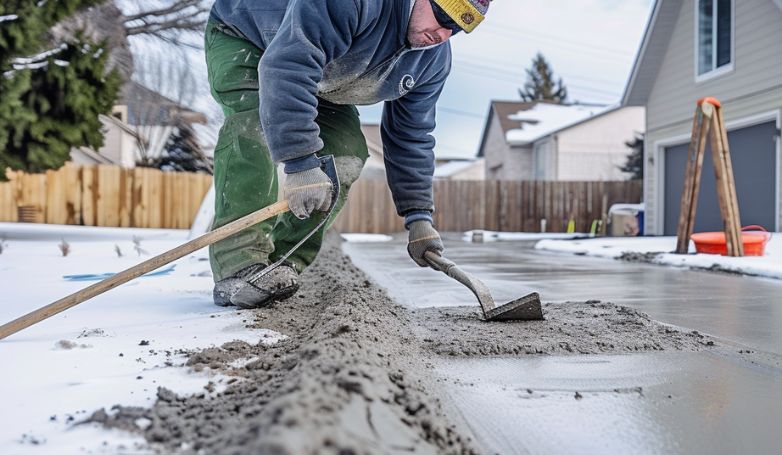
Pouring concrete in winter requires special procedures to ensure the material sets correctly without freezing. Concrete sets slower in cold weather, increasing the risk of frost damage before curing. Additives such as calcium chloride can be mixed into the concrete to accelerate setting times. Additionally, insulating blankets or heated enclosures might be necessary to maintain adequate temperature until the concrete achieves initial set strength.
Best Practices
Use a concrete mix designed for cold weather, apply thermal insulating materials to protect the concrete post-pour, and avoid pouring on days when temperatures are expected to fall below freezing.
Threshold for Paving: Below 32°F
Gravel Driveway Paved In Winter
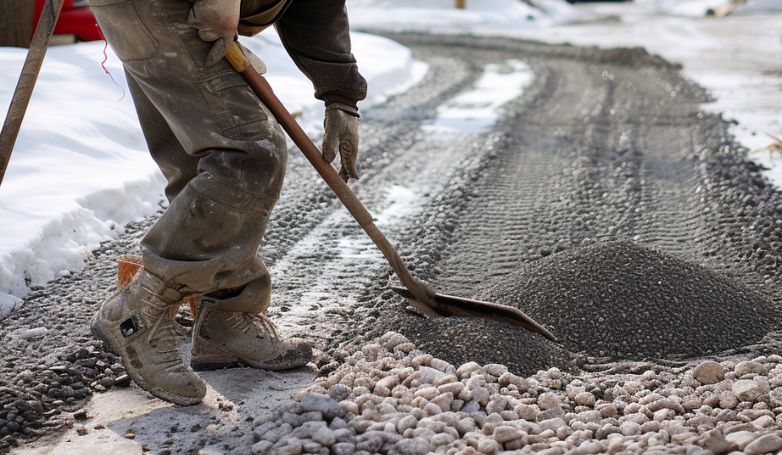
Installing or repairing a gravel driveway in winter is less dependent on temperature, making it a viable option throughout the season. The main challenges include managing snow removal without displacing the gravel and addressing the impact of freeze-thaw cycles on the driveway’s level and compactness.
Best Practices
Regular maintenance to redistribute displaced gravel, application of a new gravel layer as needed, and installation of robust edging to contain the gravel effectively. Snow removal should be done carefully to avoid scattering the gravel.
Threshold for Paving: Not temperature sensitive
Stone Driveway Paved in Winter
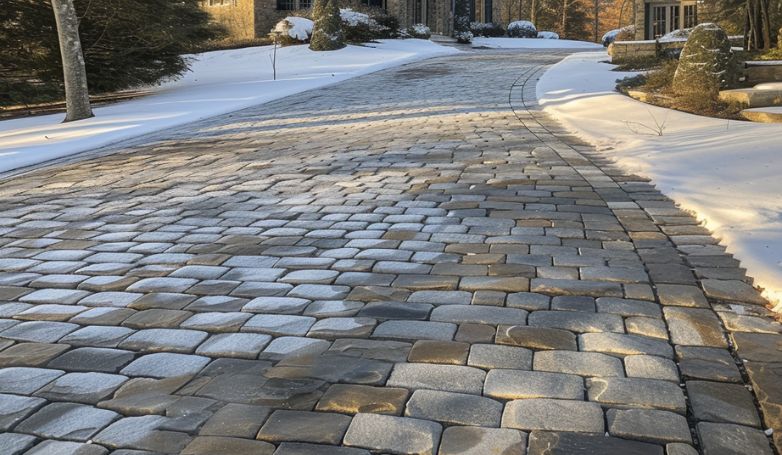
Stone driveways can be installed or maintained in winter without significant weather-related concerns. Stone’s durability withstands freezing temperatures well, but snow removal and the prevention of ice formation are considerations for maintaining surface safety and integrity.
Best Practices
Ensure proper drainage to prevent water accumulation and freezing, use gentle snow removal techniques to protect the stone surface, and apply sand or non-corrosive deicers to enhance traction without damaging the stone.
Threshold for Paving: Not temperature sensitive
Brick Pavers Driveway Paved in Winter
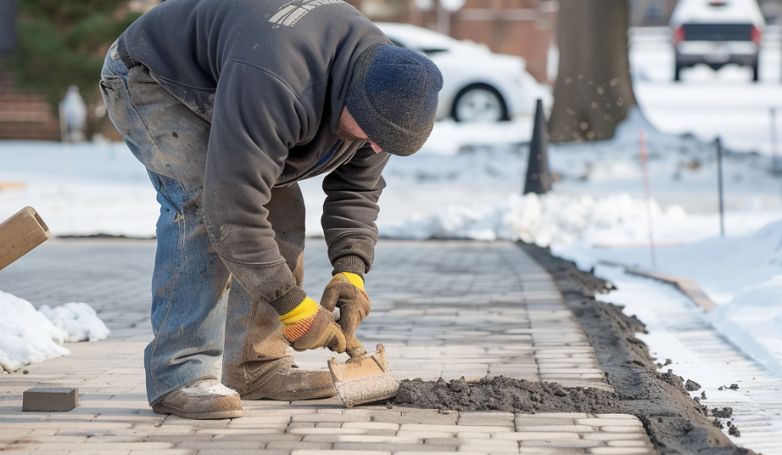
Brick pavers offer flexibility and resilience against winter’s freeze-thaw cycles, making them suitable for winter installation projects. However, careful preparation of the base layer is crucial to prevent shifting or heaving from frost.
Best Practices
Ensure a well-compacted base to minimize movement, select high-quality pavers designed for cold climates, and consider using polymeric sand in the joints to lock pavers together and reduce the risk of displacement.
Threshold for Paving: Not temperature sensitive
Tar and Chip Driveway Paved in Winter
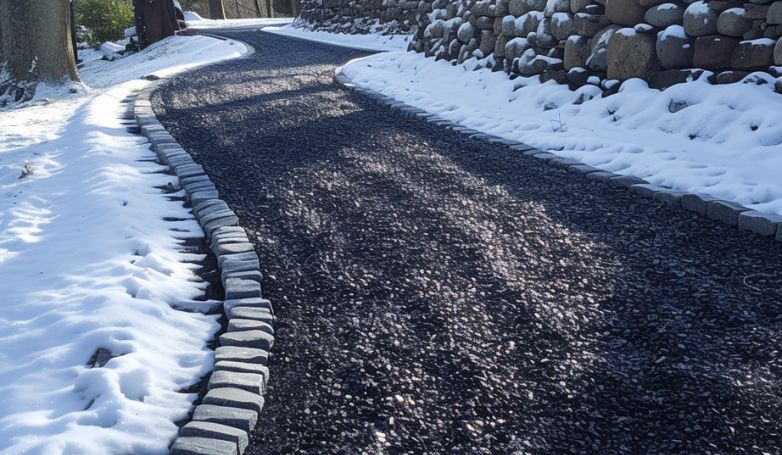
Tar and chip driveways, while less common, can also be considered for winter installation. The key is the temperature sensitivity of the tar, which needs to be hot enough to bond effectively with the stone chips. Cold weather can complicate this process by causing the tar to cool too rapidly.
Best Practices
Schedule the project during milder winter weather, ensure the tar is applied at the correct temperature, and plan for quick application and chip spreading to achieve optimal adhesion and surface texture.
Threshold for Paving: Below 50°F
Benefits of Driveway Winter Paving
Paving a driveway in winter might seem unconventional, but it offers unique benefits worth considering for homeowners looking to enhance their property during the colder months. Let’s explore these advantages in more detail.
Availability of contractors
Winter often sees a reduction in construction and paving projects due to the cold weather, making it easier to hire contractors. This availability can lead to more personalized attention to your project, as contractors have fewer concurrent jobs. With the seasonal slowdown, you might find that contractors are more willing to negotiate terms or accommodate specific scheduling requests, providing a smoother and more attentive service experience.
Potential cost savings
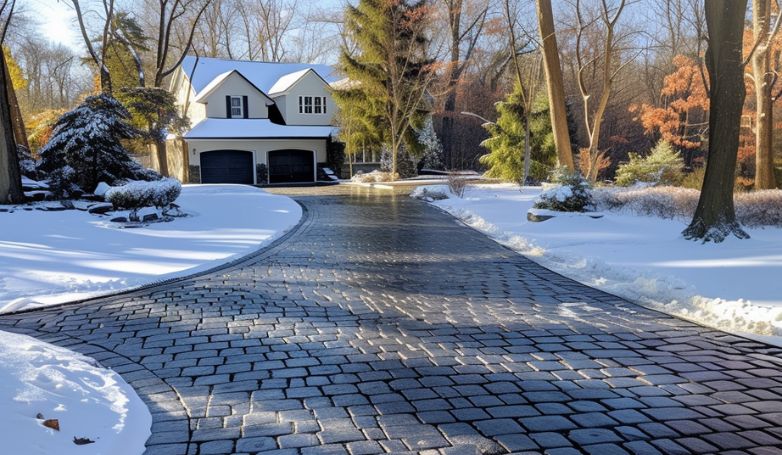
Since winter is traditionally an off-peak season for paving projects, there’s a potential for cost savings. Contractors may offer competitive pricing to secure business during these slower months. This can result in significant savings on labor costs, and sometimes even on materials. Homeowners looking to maximize their budget while achieving high-quality results might find winter paving an attractive option for this reason.
Faster completion due to reduced demand
With fewer projects in the pipeline, contractors can often allocate more resources and manpower to winter projects, leading to faster completion times. The reduced workload allows for a more focused approach to your driveway project, potentially speeding up the timeline from start to finish. This efficiency is a significant advantage for homeowners eager to minimize disruption and have their new driveway ready for use as soon as possible.
Combining the benefits of increased contractor availability, potential cost savings, and faster project completion, winter paving presents a compelling option for homeowners. While it’s important to consider the specific material and weather-related challenges, the advantages can make winter the ideal time for your driveway paving project.
Challenges of Driveway Winter Paving
While winter paving can offer several benefits, it also introduces specific challenges that homeowners and contractors must navigate to ensure a successful project. Let’s delve into these hurdles to better understand the complexities of winter driveway paving.
Limited working hours and daylight
One of the primary challenges of winter paving is the reduced number of working hours available due to shorter daylight periods. This limitation can significantly impact the scheduling and progression of a paving project, as most outdoor construction work relies heavily on natural light for visibility and safety. The need to complete tasks within this restricted time frame can pressure both contractors and homeowners, potentially affecting the overall pace and quality of the work.
Importance of proper planning and coordination
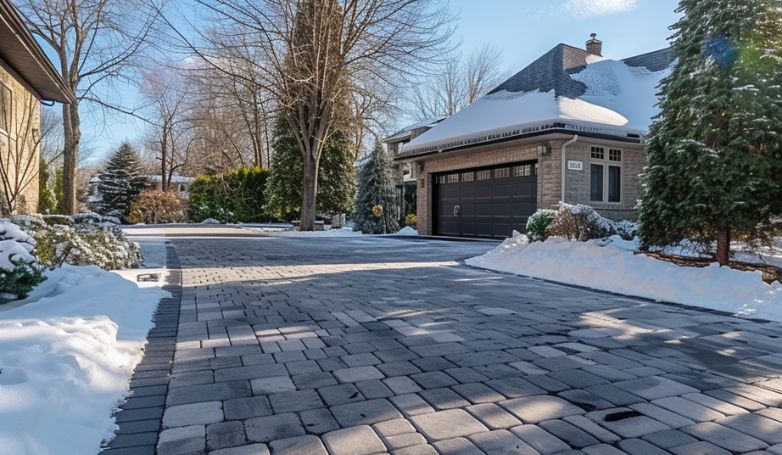
Winter paving demands meticulous planning and coordination to counteract the unpredictable weather conditions and the logistical challenges of cold-weather construction. This includes ensuring that materials are delivered on time and that any necessary equipment is available and functional in colder temperatures. Delays or oversights in planning can lead to project setbacks, as the window for favorable weather conditions can be narrow. Effective communication between homeowners and contractors becomes crucial to navigate these complexities successfully.
Potential issues with material curing and bonding
The cold weather affects the curing and bonding processes of paving materials, which are critical to the durability and longevity of the driveway. Materials like concrete and asphalt have specific temperature requirements for proper curing, and failing to meet these can result in weakened structures prone to premature cracking and other forms of damage. Additionally, the cold can make it difficult for new materials to bond correctly with existing surfaces, potentially compromising the integrity of the finished driveway.
Navigating these challenges requires a detailed understanding of the materials involved, a proactive approach to project management, and a willingness to adapt to the constraints imposed by the winter season.
Tips for Successful Driveway Winter Paving
To ensure the success of your driveway paving project during the colder months, there are several key strategies to consider. Let’s explore these essential tips,
Choosing the right materials
The key to a successful winter paving project lies in selecting materials that can withstand the unique challenges of cold weather. For asphalt driveways, using a hot mix asphalt that retains heat longer is crucial for ensuring it remains workable during application and compaction. For concrete driveways, special cold-weather mixes with accelerators to speed up curing times can be invaluable. Gravel, stone, and brick pavers are more forgiving in winter conditions but still require thoughtful selection to ensure durability and ease of maintenance post-installation.
Monitoring and managing temperature conditions
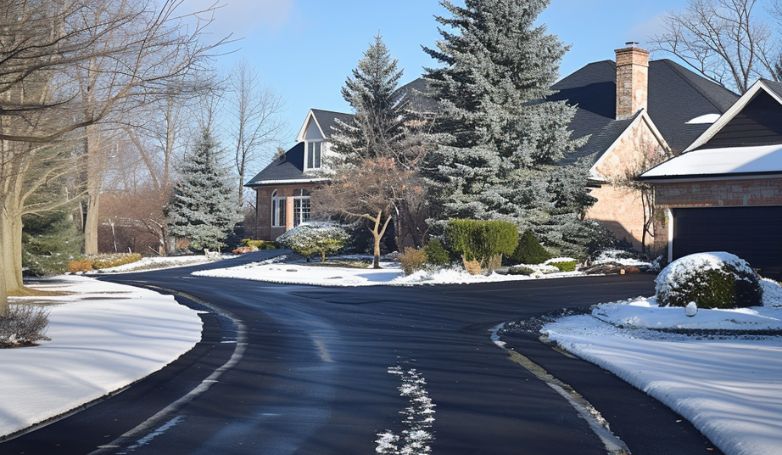
Successfully paving a driveway in winter requires vigilant monitoring of temperature conditions to ensure they align with the specifications needed for the chosen paving material. This involves not only keeping an eye on the daily weather forecast but also understanding how ground temperature and moisture levels can impact material curing and bonding. Using thermal blankets or heated enclosures can help maintain adequate temperatures for concrete curing, while asphalt projects may need to be scheduled during the warmer parts of the day.
Working with experienced contractors
Perhaps the most critical factor in ensuring the success of a winter paving project is partnering with contractors who have experience in navigating the season’s challenges. These professionals will have a deep understanding of how to adapt to reduced daylight hours, cold temperatures, and material handling requirements specific to winter conditions. They’ll also be adept at planning and executing projects within the tight timelines that winter weather permits, minimizing the risks of delays or compromised quality.
Implementing these tips can significantly enhance the prospects of a successful driveway paving project during the winter, resulting in a durable and aesthetically pleasing driveway ready to withstand the elements.
FAQs about Can a Driveway be Paved in Winter?
Here are some frequently asked questions to help clarify common concerns about paving driveways in winter and the ideal conditions for doing so.
What temperature is too cold to pave?
The temperature threshold for paving operations, especially with asphalt, is typically around 50 degrees Fahrenheit (10 degrees Celsius). Below this temperature, asphalt can cool too quickly, hindering proper compaction and leading to a less durable surface. For concrete, cold weather mixes and accelerators allow for pouring at lower temperatures, but it is generally advisable to avoid temperatures below freezing to ensure proper curing.
What time of year is best to pave a driveway?
The best time of year to pave a driveway is late spring through early fall. This period offers the ideal temperature range and weather conditions for asphalt and concrete paving materials to cure and set properly. These conditions provide a conducive environment for paving operations, including optimal daylight hours and minimal precipitation, which are crucial for ensuring the quality and longevity of the paving work.
Is asphalt or concrete driveway better in winter?
Both asphalt and concrete driveways have their advantages and disadvantages in winter conditions. Asphalt absorbs heat and can melt snow faster, which might be beneficial in cold climates. However, it can also be more susceptible to damage from freeze-thaw cycles. Concrete, while more resistant to salt and chemicals used for deicing, can be prone to cracking if not properly installed with joint spacing to accommodate temperature changes. The best choice depends on specific local climate conditions, maintenance considerations, and personal preferences regarding aesthetics and long-term durability.
Conclusion
Paving a driveway in winter is feasible, with benefits like easier contractor scheduling and potential cost savings. However, it requires careful consideration of challenges like limited daylight and temperature-sensitive materials. Success hinges on selecting appropriate materials, effective weather management, and experienced contractors. Whether you choose asphalt, concrete, or another material, understanding winter paving specifics is crucial for a durable driveway. Preparation and professional guidance are key to navigating winter’s complexities, ensuring a smooth paving process.

